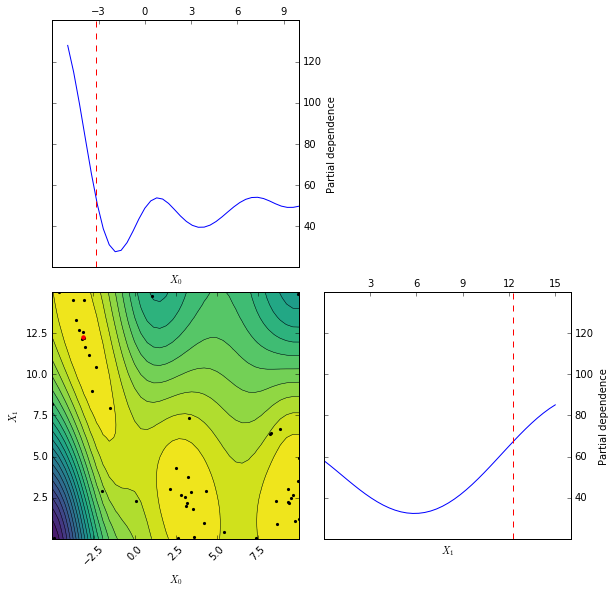Sequential model-based optimization toolbox.
Project description
Scikit-Optimize
Scikit-Optimize, or skopt, is a simple and efficient library for optimizing (very) expensive and noisy black-box functions. It implements several methods for sequential model-based optimization. skopt aims to be accessible and easy to use in many contexts.
The library is built on top of NumPy, SciPy, and Scikit-Learn.
We do not perform gradient-based optimization. For gradient-based optimization algorithms look at scipy.optimize here.

Approximated objective function after 50 iterations of gp_minimize. Plot made using skopt.plots.plot_objective.
Maintaining the codebase
This repo is a copy of the original repositoy at https://github.com/scikit-optimize/scikit-optimize/. As the original repo is now in read-only mode, i decided to continue the development on it on my own. I still have credentials for pypi, so I will publish new releases at https://pypi-hypernode.com/project/scikit-optimize/. I did my best to include all open PR since 2021 in the new release of scikit-optimize 0.10.
https://scikit-optimize.github.io/ has been moved to http://scikit-optimize.readthedocs.io/.
Important links
Project website https://scikit-optimize.readthedocs.io/
Example notebooks - can be found in examples.
Issue tracker - https://github.com/holgern/scikit-optimize/issues
Conda feedstock - https://github.com/conda-forge/scikit-optimize-feedstock
Install
scikit-optimize requires
Python >= 3.8
NumPy (>= 1.20.3)
SciPy (>= 0.19.1)
joblib (>= 0.11)
scikit-learn >= 1.0.0
matplotlib >= 2.0.0
You can install the latest release with:
pip install scikit-optimize
This installs the essentials. To install plotting functionality, you can instead do:
pip install 'scikit-optimize[plots]'
This will additionally install Matplotlib.
If you’re using Anaconda platform, there is a conda-forge package of scikit-optimize:
conda install -c conda-forge scikit-optimize
Using conda-forge is probably the easiest way to install scikit-optimize on Windows.
Getting started
Find the minimum of the noisy function f(x) over the range -2 < x < 2 with skopt:
import numpy as np
from skopt import gp_minimize
def f(x):
return (np.sin(5 * x[0]) * (1 - np.tanh(x[0] ** 2)) +
np.random.randn() * 0.1)
res = gp_minimize(f, [(-2.0, 2.0)])For more control over the optimization loop you can use the skopt.Optimizer class:
from skopt import Optimizer
opt = Optimizer([(-2.0, 2.0)])
for i in range(20):
suggested = opt.ask()
y = f(suggested)
opt.tell(suggested, y)
print('iteration:', i, suggested, y)Read our introduction to bayesian optimization and the other examples.
Development
The library is still experimental and under development. Checkout the next milestone for the plans for the next release or look at some easy issues to get started contributing.
The development version can be installed through:
git clone https://github.com/holgern/scikit-optimize.git cd scikit-optimize pip install -e .
Run all tests by executing pytest in the top level directory.
To only run the subset of tests with short run time, you can use pytest -m 'fast_test' (pytest -m 'slow_test' is also possible). To exclude all slow running tests try pytest -m 'not slow_test'.
This is implemented using pytest attributes. If a tests runs longer than 1 second, it is marked as slow, else as fast.
All contributors are welcome!
Pre-commit-config
Installation
pip install pre-commit
Using homebrew
brew install pre-commit pre-commit --version pre-commit 2.10.0
Install the git hook scripts
pre-commit install
Run against all the files
pre-commit run --all-files pre-commit run --show-diff-on-failure --color=always --all-files
Update package rev in pre-commit yaml
pre-commit autoupdate pre-commit run --show-diff-on-failure --color=always --all-files
Making a Release
The release procedure is almost completely automated. By tagging a new release, CI will build all required packages and push them to PyPI. To make a release, create a new issue and work through the following checklist:
[ ] check if the dependencies in setup.py are valid or need unpinning,
[ ] check that the doc/whats_new/v0.X.rst is up-to-date,
[ ] did the last build of master succeed?
[ ] create a [new release](https://github.com/holgern/scikit-optimize/releases),
[ ] ping [conda-forge](https://github.com/conda-forge/scikit-optimize-feedstock).
Before making a release, we usually create a release candidate. If the next release is v0.X, then the release candidate should be tagged v0.Xrc1. Mark the release candidate as a “pre-release” on GitHub when you tag it.
Made possible by
The scikit-optimize project was made possible with the support of




If your employer allows you to work on scikit-optimize during the day and would like recognition, feel free to add them to the “Made possible by” list.
Project details
Release history Release notifications | RSS feed
Download files
Download the file for your platform. If you're not sure which to choose, learn more about installing packages.
Source Distribution
Built Distribution
File details
Details for the file scikit-optimize-0.10.1.tar.gz.
File metadata
- Download URL: scikit-optimize-0.10.1.tar.gz
- Upload date:
- Size: 86.1 kB
- Tags: Source
- Uploaded using Trusted Publishing? No
- Uploaded via: twine/5.0.0 CPython/3.12.2
File hashes
| Algorithm | Hash digest | |
|---|---|---|
| SHA256 | 1016e953e3b4de14f16c049efaf14eeaf347a08cf135488447c16c45dadadbc4 |
|
| MD5 | 1fc93259d538bab8323ff6a53dee45ec |
|
| BLAKE2b-256 | 6d37373b7bfea9226c26e1297016603741531ca29b668675694c40002bdb4e20 |
File details
Details for the file scikit_optimize-0.10.1-py2.py3-none-any.whl.
File metadata
- Download URL: scikit_optimize-0.10.1-py2.py3-none-any.whl
- Upload date:
- Size: 107.7 kB
- Tags: Python 2, Python 3
- Uploaded using Trusted Publishing? No
- Uploaded via: twine/5.0.0 CPython/3.12.2
File hashes
| Algorithm | Hash digest | |
|---|---|---|
| SHA256 | 044fb125ede1275f7cae7c70327af7f0bd7ec3ed0243c7401b29a4b8f94cb385 |
|
| MD5 | fa8a1376bc8bbd39f747bd5b352c846d |
|
| BLAKE2b-256 | 900e15deb91b3db0003843e34e72fa865e1d92013781d986fdc65483c99a9f69 |



















